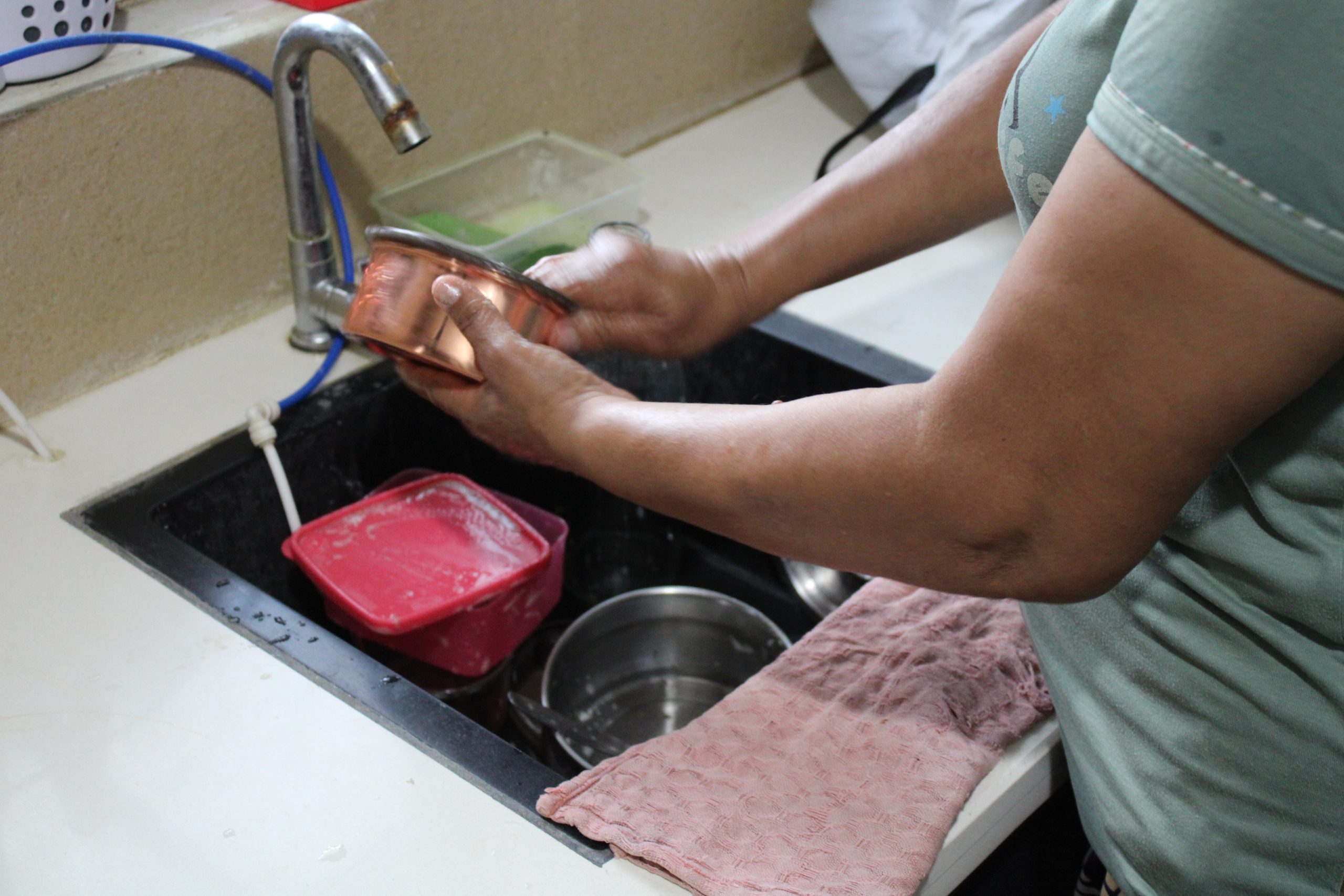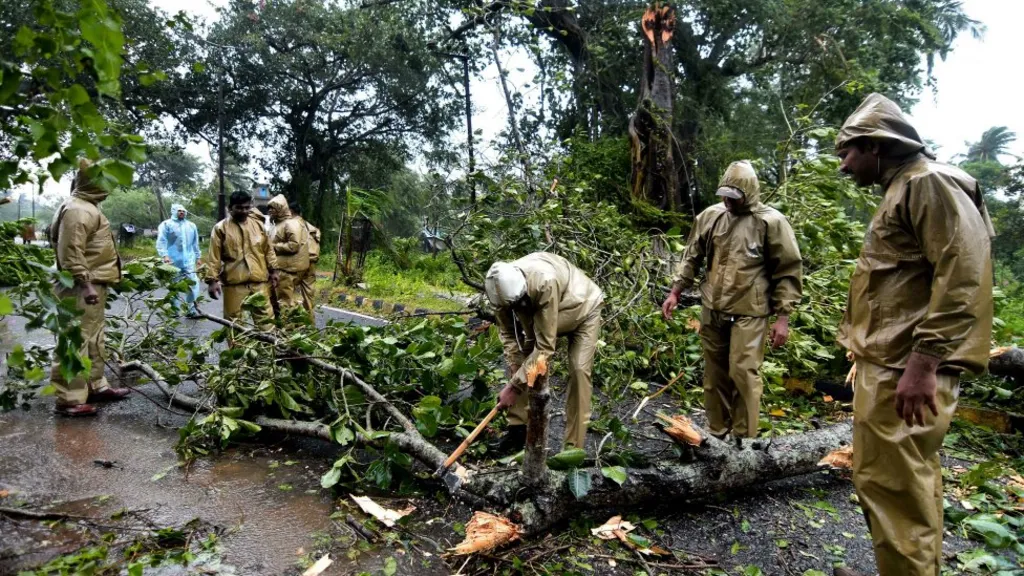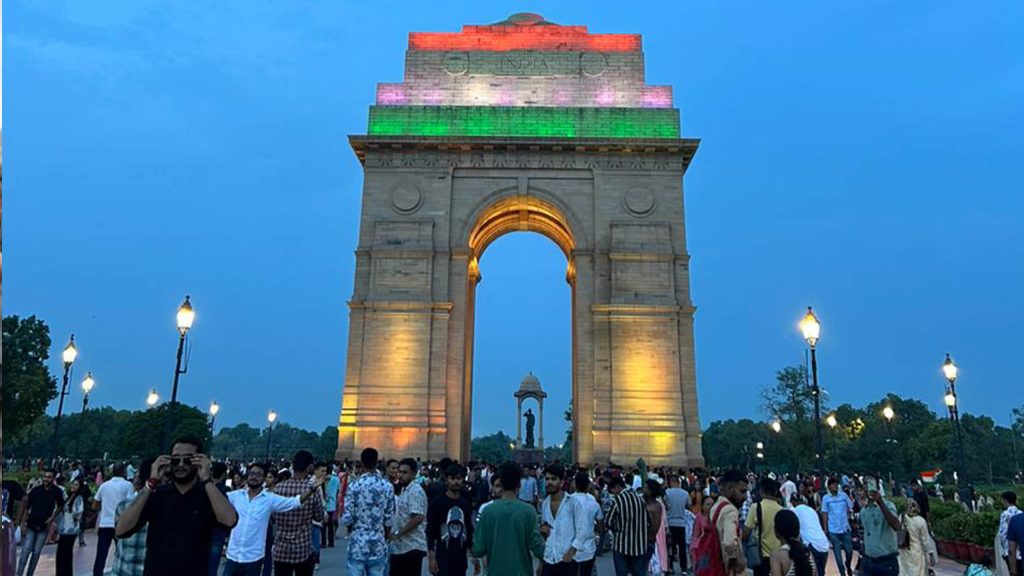In high-rises and apartment complexes across India, the caste and class-based segregation of domestic workers is often stark. Prohibitions against using employers’ toilets and mandating the use of separate elevators for domestic workers and delivery persons are commonplace. Noor (name changed), a domestic worker from Bengaluru, shares that she cleans the toilets in her employer’s house, but is not allowed to use them, even during emergencies. Noor begins her day at 5 a.m., completing household chores in multiple homes, and yet cannot drink water regularly in fear of needing to access the bathroom, which her employers do not allow. Ultimately, this neglect led to kidney stones, highlighting the inhumane working conditions and indignity faced by these workers.
In India, domestic work carries deep-rooted socio-cultural stigmas, tied to the country’s entrenched hierarchies of caste, religion, gender, and class. Most domestic workers come from marginalised communities—Dalits, Adivasis, and religious minorities, particularly Muslims. Women make up over 80% of this workforce, indicating the gendering of domestic work: problematic, as women are already in a precarious position within the workforce. In addition, domestic workers have long been stigmatised as unhygienic, dirty, and untrustworthy. It is not uncommon to see employers on social media seeking to hire domestic workers from specific communities, such as Hindus, or even from Brahmin or other upper-caste groups.
These age-old stereotypes are compounded by app-based platforms that promise to solve these problems with technology. However, these problems are not technological. Rather, these are social problems, rooted in systemic exclusion and caste-based discrimination.
Urban Company, one of the major companies providing platform-based services in India, is known for providing workers for various home services, such as plumbing and carpentry. It recently added a new offering to its list of services: “Insta Maid,” a service which provides for domestic workers to reach employers’ homes within 15 minutes, at a rate of Rs 49 per hour.
The launch of the “Insta Maid” service triggered a significant backlash, prompting a superficial rebrand to “Insta Help. ” While this name change was initiated to sanitise the image of the company, the underlying issue remains: the commodification of domestic labour within India’s rapidly expanding gig economy. Furthermore, Insta Maid’s pricing model is not just an economic strategy. Rather, it institutionalises the historical devaluation of domestic work in Indian society. By algorithmically managing what has traditionally been informal labour, these platforms formalise exploitation under the guise of convenience and technology.
The algorithms behind platforms such as Urban Company function by learning from user interactions and the preferences of customers. These algorithms collect data on customer choices, including ratings given to workers, and the specific worker profiles viewed or selected. Based on this data, the algorithms identify patterns, prioritising worker profiles that align with those preferences. As noted above, these preferences can be backed by caste, religion, or ethnicity-based discrimination. The algorithm’s tendency to prioritise certain workers based on discriminatory factors thus reinforces these biases, resulting in a segregated and excluded workforce, divided along caste and religious lines.
DISCRIMINATION FACED BY MIGRANT DOMESTIC WORKERS
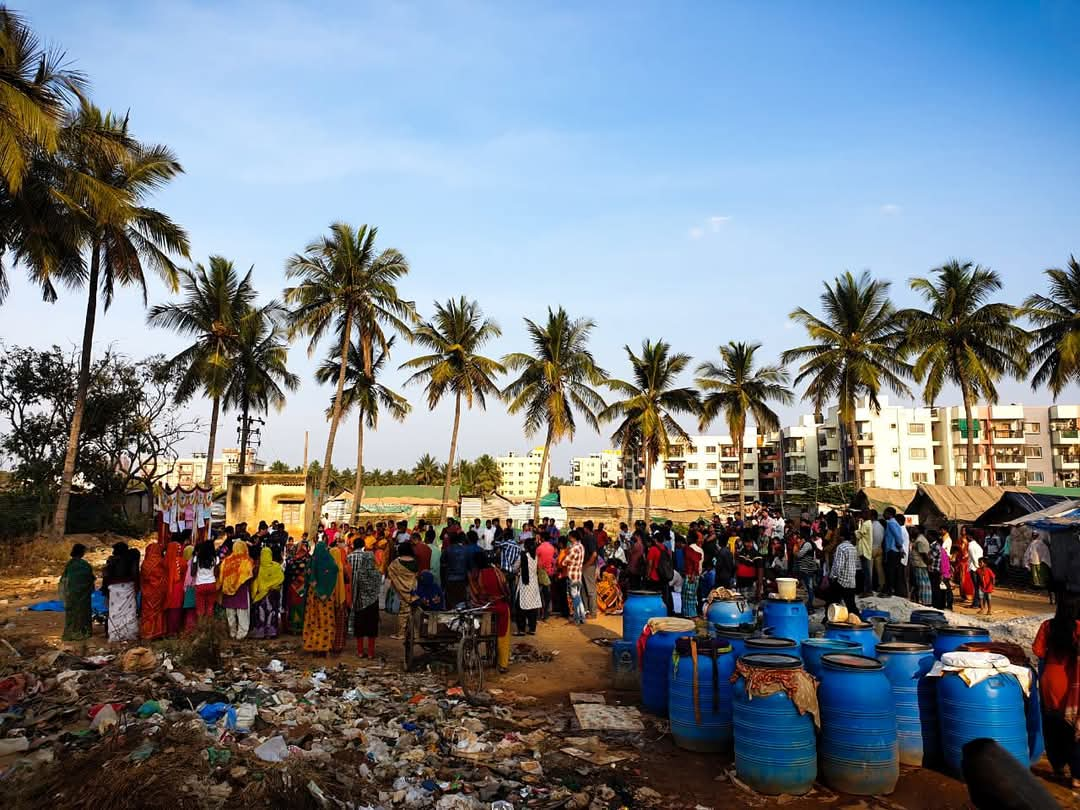
Another consideration in terms of the discrimination against domestic workers is their migration status. Migrant workers, particularly those from marginalised communities, face compounded discrimination based on religion, ethnicity, and caste. Muslim domestic workers, in particular, are subjected to heightened suspicion in a climate of increasing religious polarisation.
Bengaluru city witnesses one of the highest influxes of internal migrant domestic workers, many of whom come from the most neglected and marginalised districts of West Bengal. These workers primarily reside within slums in Bengaluru: areas that lack basic infrastructure such as drainage systems, sanitation, water facilities, and regular electricity. They live in shanties and pay between Rs 2000 to 3000 per room.
The rooms are cramped and dingy, with no ventilation, and accommodate families of four to five. Drinking water must be purchased separately, and electricity is often available only at night. Their children are first-generation learners, attending NGO-run schools. These migrant domestic workers, often from the Muslim community, are frequently labelled “Bangladeshi immigrants” by apartment societies, the police, and the administration, further marginalising them and exposing them to discriminatory practices.
THE BACKBONE OF INDIAN HOUSEHOLDS, BUT OFTEN CRIMINALISED
Domestic workers are often the first suspects when items go missing in employers’ homes. The state system is overwhelmingly stacked against workers, favouring the employer at every turn. Many workers describe being subjected to humiliating interrogations by state authorities, illegal detentions, and even physical violence when accused of theft, often without evidence.
In one tragic case, a 40-year-old domestic worker in Karnataka died by suicide just a day after her employer filed a theft complaint against her, unable to bear the humiliation. This is a stark reminder of how the system further brutalises vulnerable workers without any sense of justice or due process.
Migrant workers face even further criminalisation. In Bengaluru, one of the largest hubs for migrant domestic workers, many come from neglected and marginalised districts in West Bengal. They live in slums owned by local landlords and face harassment from both the landlords and police. Language barriers make these workers easy targets for the police, who frequently round them up, demanding documents to prove their citizenship.
There have been numerous cases of forceful evictions and demolitions of migrant workers’ slum dwellings by bulldozers across Bengaluru, with accusations of them being illegal immigrants from Bangladesh. With every demolition, children lose their homes, books, and often drop out of school, joining the stream of cheap labour. Once the slums are destroyed, real estate projects often replace them, revealing whose interests the police and administration are truly serving. The city, its offices, and homes cannot function without the labour of these workers. Yet, they are denied dignity, their labour is neither recognised nor adequately compensated, and they can be thrown out at any time. Despite being indispensable to the functioning of the city, these workers are denied dignity, job security, and secured accommodation.
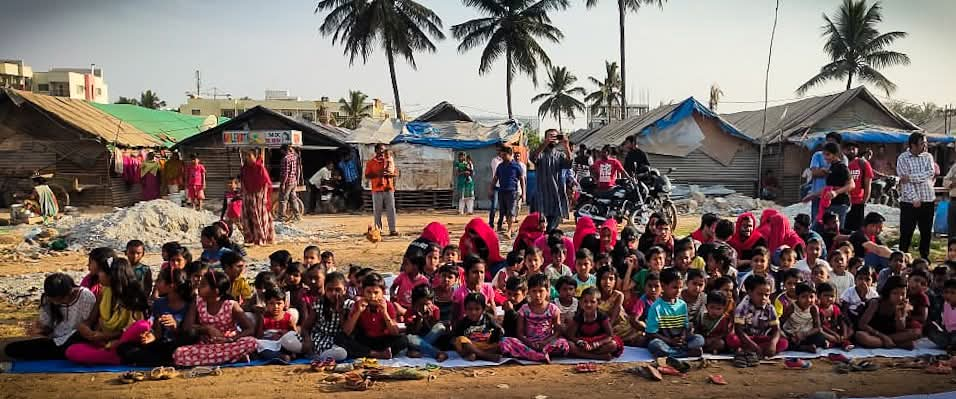
In July 2017, when a migrant domestic worker, Zohra Bibi, went missing after allegations of theft were made against her at Noida’s Mahagun Moderne Apartment, the state machinery and upper-class residents unleashed a series of retaliatory actions. Zohra’s husband and other workers, seeking to find her, were met with police raids, the detention of 58 individuals, including a minor, and the arrest of 13 workers on false charges of attempt to murder. The Residents Welfare Association, backed by the police, further targeted domestic workers by blacklisting 143 of them from the society, accusing them of being illegal immigrants. Union minister Mahesh Sharma threatened the domestic workers who had been arrested by the police claiming, “they will not get bail for years to come.” On the contrary, reports point out that no resident of Mahagun Moderne reported any injuries, and none of the FIRs mention any attempts of physical attacks on the residents themselves. Union Minister Sharma even joked to the residents of Mahagun Moderne that most people find their “naukranis” more valuable than their spouses.
Also linked to the larger issue of digitisation is the trend across several residential societies to use an app called MyGate. Designed to manage apartment security, it allows employers to rate their domestic workers on various parameters, such as attitude, punctuality, and quality of service. Employers can also track leave days taken by workers and even file complaints, which are visible to other employers, potentially reducing the workers’ chances of being hired by anyone else. However, workers on MyGate cannot see their own ratings, or rate their employers. Additionally, every time a domestic worker leaves an apartment complex, her bag is checked. If she is carrying any item, the employer is notified, and the worker is only allowed to leave only once the employer gives an approval through the app. The underlying assumption is that domestic workers are inherently prone to stealing.
FROM REGULAR INVISIBILISATION TO THE PHYSICAL TOLL OF WORK
The invisibility of domestic work extends far beyond the labour itself—it affects the workers’ entire lives. While maintaining spotless, affluent homes for their employers, domestic workers often return to cramped, unsanitary living conditions in urban slums or informal labour colonies. Their own housing typically lacks basic amenities like sanitation, clean drinking water, and electricity. These workers commute for hours between impoverished slums and affluent neighbourhoods, effectively existing in two separate worlds. Their work remains largely unrecognised in labour frameworks, and they are expected to work silently, without asserting their rights. Without any policy or legislation in place, domestic workers are granted holidays at the discretion of their employers, and often face wage deductions for taking leave.
This invisibility is not accidental: it is functional. Society benefits from their essential labour while denying them the rights and dignity they deserve.
In addition to their daily invisibilisation, the physical toll of domestic work is severe. By their 40s and 50s, many domestic workers develop chronic health conditions like severe back problems, arthritis, respiratory issues from chemical cleaning agents, and skin conditions from constant exposure to water and cleaning chemicals. This burden is particularly gendered. When women perform domestic tasks in their own homes, their labour is unpaid and unrecognised. They then perform identical tasks in others’ homes, which is severely underpaid. This vicious cycle traps women in a state of physical deterioration, without access to proper healthcare or recovery time.
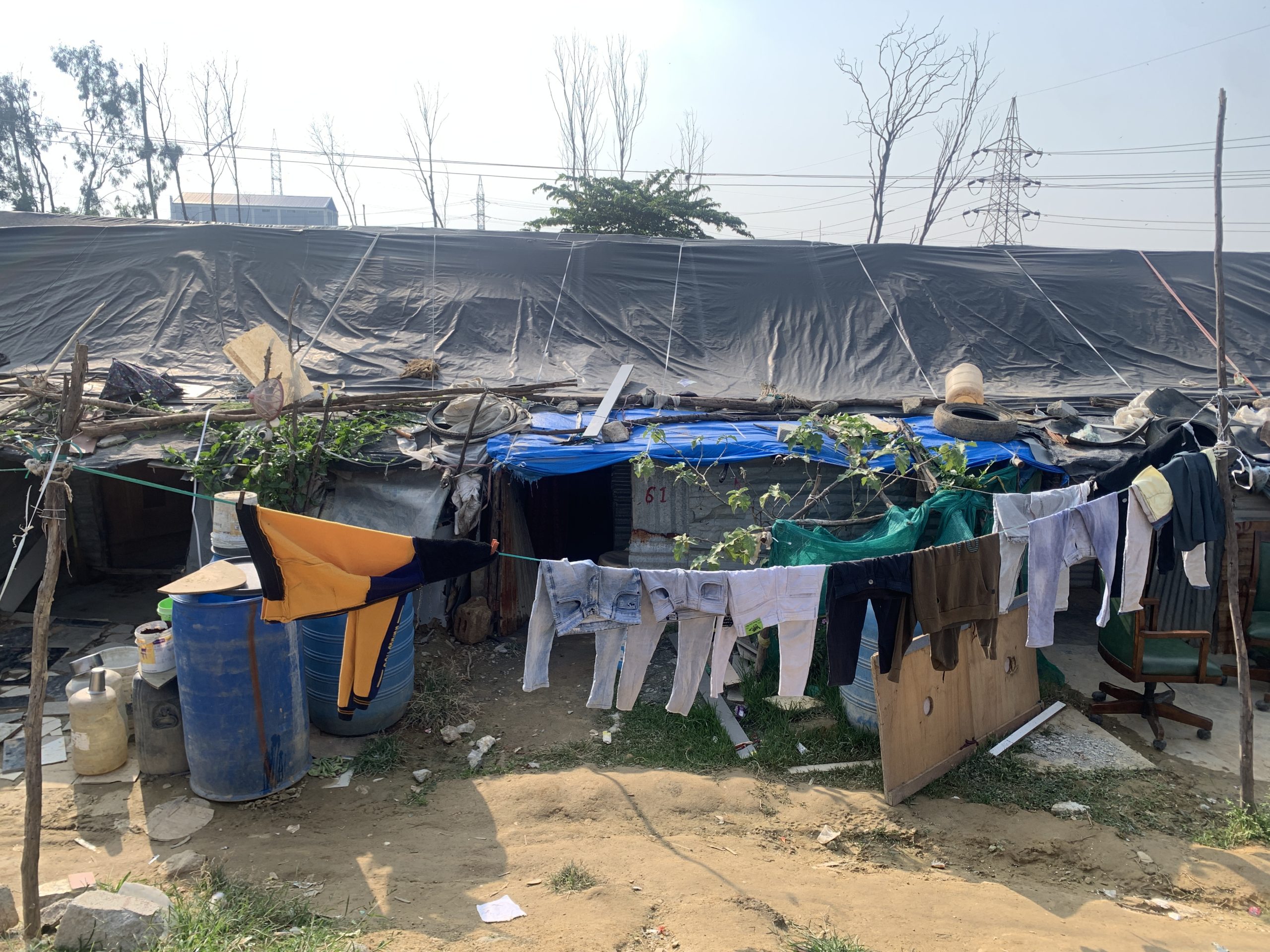
The precarity faced by live-in domestic workers—most of whom are migrants—is even more acute. In November 2024, an 11-year-old girl trafficked from Jharkhand to work in Noida was held captive, starved, beaten, and paid only Rs. 5,000 per month for more than 18 hours of daily work. Despite laws prohibiting child labour, recruitment and/or third-party agencies continue to exploit vulnerable children from poverty-stricken families, promising money to their parents before bringing them to cities and forcing them into gruelling, underpaid labour often combined with threats from employers.
THE POLICY VACUUM AND SYSTEMATIC EXCLUSION
India is a signatory to the International Labour Organization (ILO) Convention C-189 on Decent Work for Domestic Workers, yet has failed to ratify a national-level policy to protect domestic workers. In January 2025, the Supreme Court, citing rampant trafficking and exploitation, directed the union government to create a legislation for domestic workers.
Yet, despite forming one of India’s largest labour forces, domestic workers continue to exist in a policy vacuum. They lack access to basic social security measures such as provident funds, pensions, maternity benefits, health insurance. During the COVID-19 pandemic, many domestic workers were dismissed without notice or compensation.
With no unemployment benefits and limited savings, many faced food insecurity and the inability to pay rent. Government relief programs failed to reach them due to documentation requirements or digital barriers. In 2020, the Karnataka government announced a one-time COVID relief of Rs 2,000 for domestic workers under the Karnataka Unorganised Workers Social Security Board.
However, migrant workers were excluded from this relief. After unions protested, migrant workers were included in the COVID relief intervention, but with the caveat that only those holding a BPL (Below Poverty Line) card issued by the Karnataka government could receive it, effectively excluding interstate migrant workers.
LACK OF LEGAL RECOGNITION OF DOMESTIC WORK
Despite the essential nature of domestic work, India still lacks legal frameworks recognising and protecting domestic workers. The only existing legislation that acknowledges domestic workers is the POSH (Prevention of Sexual Harassment) Act, 2013, which defines the home as a workplace. Under the Ambedkar Karmika Sahaya Hastha Scheme of the Karnataka Unorganised Workers Social Security Board, domestic workers can receive a smart card for social security.
However, workers with these cards have yet to see any real social security benefits, and there is no indication of when these benefits will be provided. As highlighted at the start of this article, the rise of the gig economy further exacerbates the systematic erosion of labour protections. India’s new labour codes, consolidating 44 existing labour laws into four codes, prioritise business interests over the protection of worker rights. These codes enable precarious employment arrangements.
By recognising “fixed-term employment” as legitimate, the codes effectively legalise exploitative practices. Permanent positions are replaced by “apprentices,” “interns,” “trainees,” or “contract workers,” performing identical work at a fraction of the wage of a full-time employee, with no job security. The codes hence pave the way for replacing permanent positions with low-wage, insecure jobs, further eroding workers’ rights.
There has been demand for separate legislation for domestic workers which can provide them social security, reduce unreasonable termination, and thereby increase job security. Instead, we see that domestic workers are also engulfed into the gig system of work, where there is no job security, and every day is a struggle to find work, biased by algorithms and ratings. This situation is not isolated to domestic workers. The gig economy is expanding rapidly across sectors, including blue-collar workers like delivery personnel and security guards. It may soon extend to white-collar workers as well. This transformation is particularly alarming for women, who are disproportionately represented in precarious employment and face additional barriers to securing stable jobs.
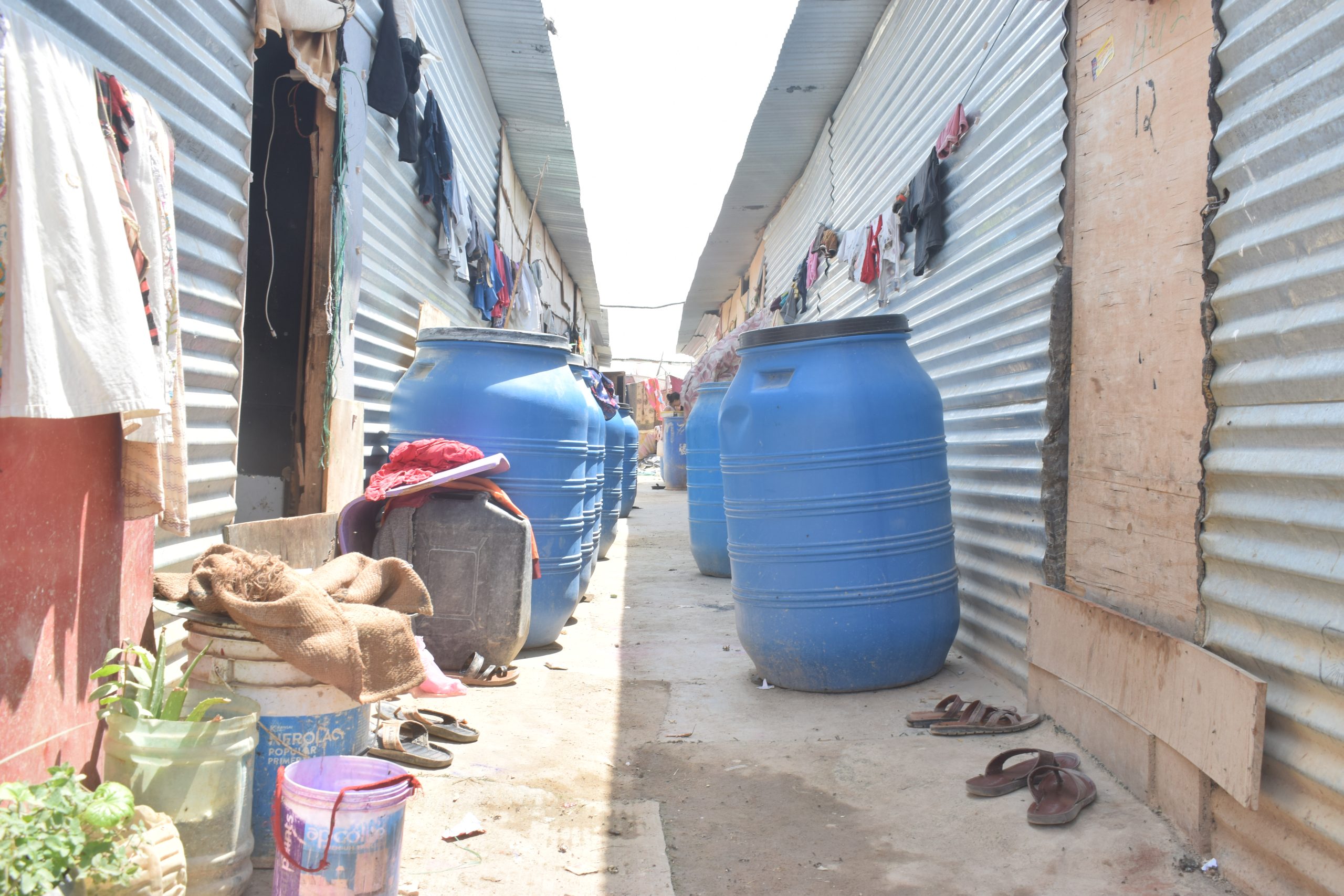
NON-RECOGNITION AS WORKERS
Gig companies often refer to their workers as “partners,” but the power dynamics tell a different story. The gig economy relies on app-based platforms that create the illusion of autonomy while workers are under constant surveillance, and their work conditions are entirely controlled by algorithms managed by companies.
Despite being referred to as “partners,” gig workers have no control over their working conditions, and their chances of securing work depend heavily on customer ratings. This system encourages a race to the bottom, where workers are forced to accept lower wages and harsher conditions. The algorithmic management of gig workers often amplifies existing societal biases, such as gender discrimination, as ratings reflect prejudices about trustworthiness and competence. If unchecked, the gig economy threatens to normalise a future where workers across sectors are stripped of protections, security, and dignity, surviving on customer ratings and uncertain work orders.
As mentioned previously, Urban Company’s rebranding from “Insta Maid” to “Insta Help” is hence a cosmetic change, designed to distract from the deeply entrenched exploitation of domestic workers. Unless we confront the structural inequalities that underpin this system and find methods of intervention, it will create an economy where precarity and job insecurity are the norm, with secured employment being the privilege of an increasingly small elite.
Still, resistance is growing. Domestic workers are organising across India, forming unions to demand legal recognition, separate legislation, and living wages, along with social security benefits. The struggle of domestic workers—overwhelmingly women from marginalised communities—against exploitation, demands recognition that domestic labour, both paid and unpaid, is not merely “women’s work” or “lower-caste work” but essential labour that is an important pillar of our economy. It thus deserves dignity, security, and fair compensation.
As reported by Oxfam, the unpaid domestic work of women is worth 43 times the annual turnover of Apple. This demonstrates the immense value of domestic work, and the crucial contribution domestic workers make to the Indian economy.
Edited by Namrata Raju
Rosey Mukherjee is a Bengaluru based activist and lawyer

